Master the Art of Babka Baking with Elegance
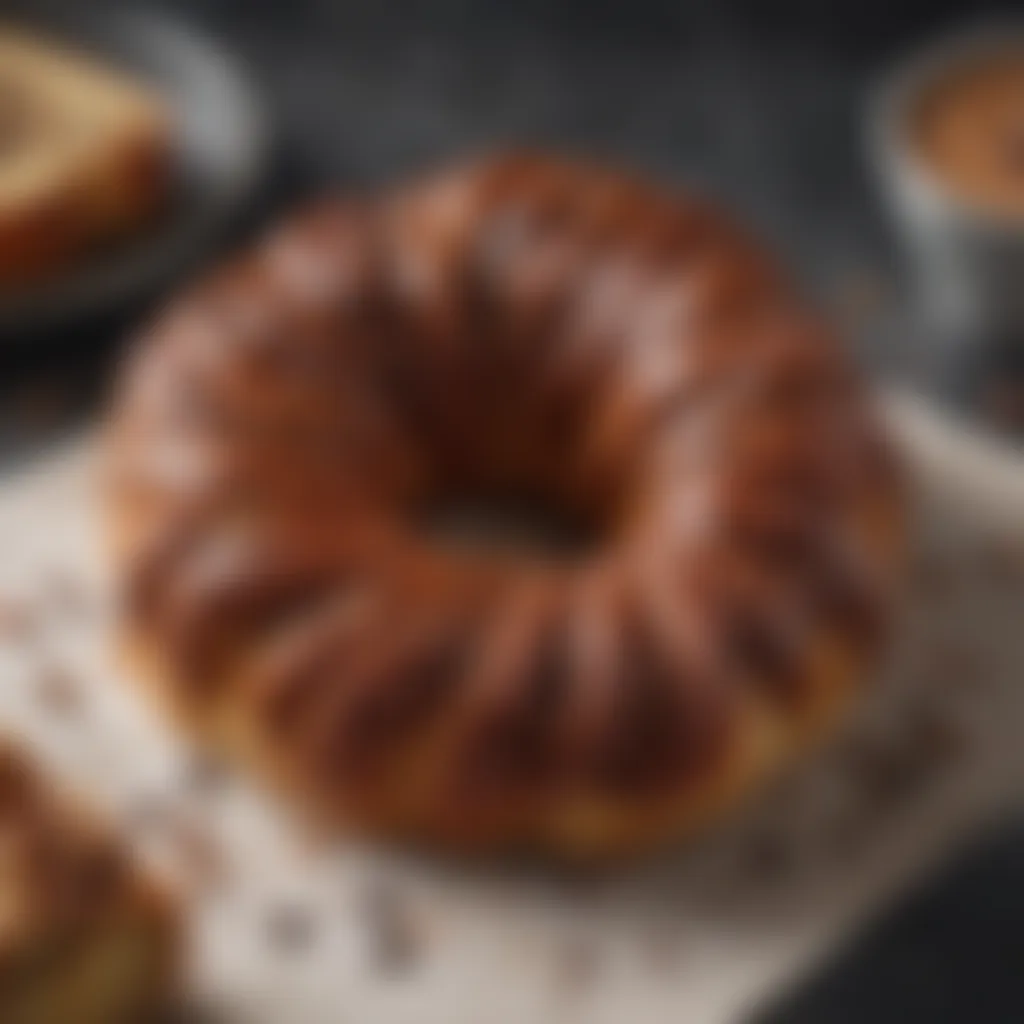
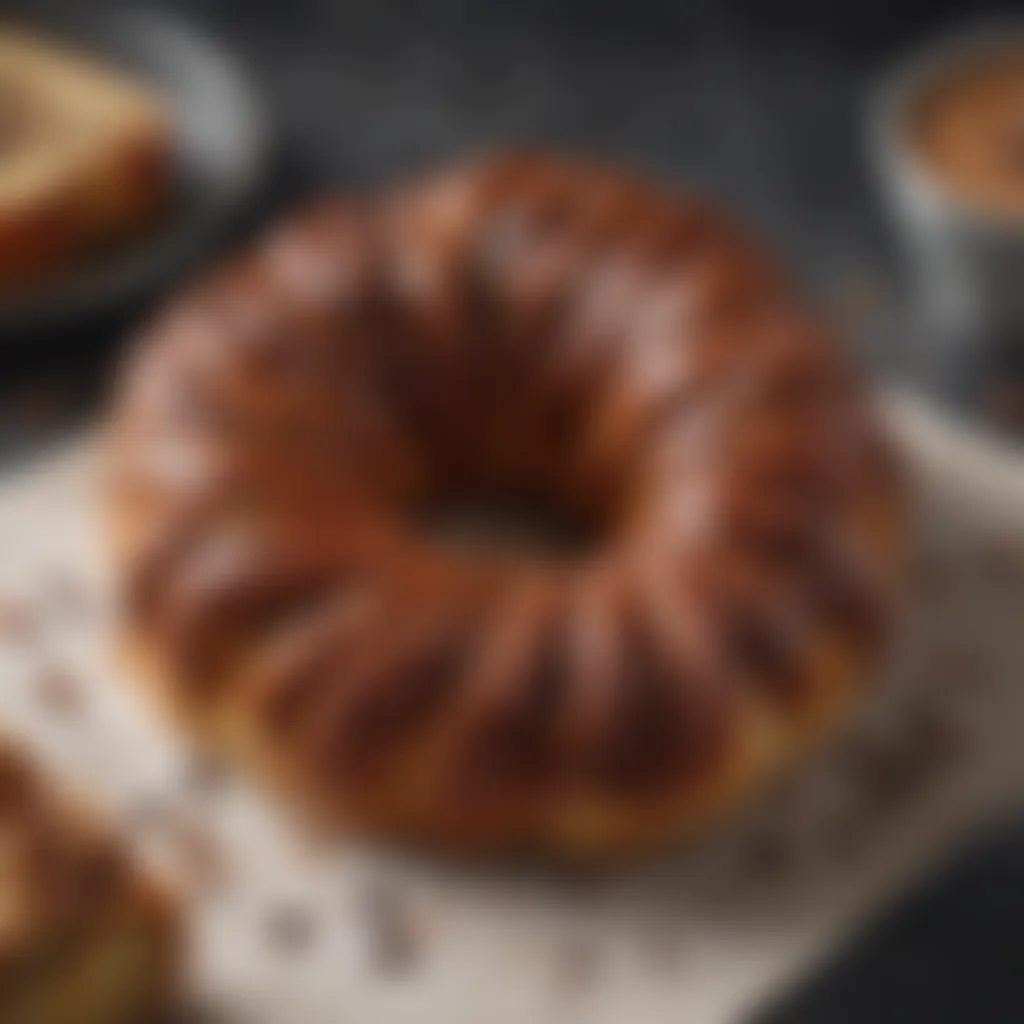
Intro
Baking a babka isn't just about making delicious food. It’s an experience steeped in history and culture. This sweet bread, often swirled with rich chocolate or sweet cinnamon, has its roots in Jewish tradition, particularly from Eastern Europe. While it may seem like a daunting task, with the right ingredients and techniques, even a novice can craft this delectable treat. Whether you're looking to create a centerpiece for a family gathering or simply indulge in a slice with your morning coffee, mastering the art of babka can provide a sense of accomplishment.
Let’s dive into the ingredients and breakdown the process to turn simple components into this mouthwatering delight.
Ingredients:
To embark on this culinary adventure, gather the following:
- For the Dough:
- For the Filling:
- For the Topping:
- 4 cups (500g) all-purpose flour
- 1/3 cup (70g) granulated sugar
- 1 tsp salt
- 2 tsp instant yeast
- 3 large eggs
- 1 cup (240ml) whole milk, warmed
- 1/2 cup (115g) unsalted butter, melted
- 1 cup (200g) dark chocolate, finely chopped
- 1/2 cup (100g) brown sugar
- 1 tsp ground cinnamon
- 1/2 cup (115g) unsalted butter, softened
- 1 egg, beaten (for egg wash)
- Powdered sugar for dusting (optional)
Each element plays a crucial role in achieving the signature flavor and texture of babka. The dough must rise properly while the filling needs to be rich and flavorful to balance the sweetness.
Preparation Steps:
Creating babka is a labor of love that includes several stages, from mixing to baking. Here’s a detailed breakdown of how to prepare it:
- Prepare the Dough:
- Prepare the Filling:
- Shape the Babka:
- Bake the Babka:
- Cool and Serve:
- In a large bowl, combine the flour, sugar, salt, and yeast. Whisk well to evenly distribute all dry ingredients.
- Make a well in the center and crack in the eggs. Slowly add the warmed milk and melted butter while mixing with a spatula, until a dough starts to form.
- Knead the dough on a lightly floured surface for about 10 minutes, or until smooth and elastic. Alternatively, if you have a mixer with a dough hook, it can be kneaded on low speed for about 6-8 minutes.
- Shape the dough into a ball and place it in a greased bowl, covering it with plastic wrap or a clean towel. Let it rise in a warm place until doubled in size, about 1 to 2 hours.
- In a small bowl, mix the softened butter, brown sugar, ground cinnamon, and dark chocolate until combined. Set aside.
- Once the dough has risen, punch it down to release air. Turn it out onto a floured surface and roll it into a rectangle, roughly 16x20 inches in size.
- Spread the filling evenly over the dough, leaving a small border around the edges.
- Starting from one long edge, roll the dough tightly into a log. Pinch the seams closed.
- Cut the log in half lengthwise, revealing the layers. Twist the two halves together to form a braid.
- Place the twisted dough in a greased loaf pan and let it rise again for about 30-45 minutes.
- Preheat your oven to 350°F (175°C).
- Once the dough has finished rising, brush the top with the beaten egg and sprinkle with more sugar if desired.
- Bake for 30-35 minutes until golden brown. The internal temperature should be around 190°F (88°C).
- After baking, allow it to cool in the pan for 10 minutes before transferring to a wire rack. Dust with powdered sugar before slicing, if you like.
Baking is as much about enjoying the process as it is about the end result. Don't be discouraged by any mistakes; they can lead to remarkable discoveries in the kitchen!
Technical Aspects:
Understanding the technicalities can enhance your baking experience.
- Make sure to activate the yeast properly; mixing it with warm milk (not hot) ensures it wakes up nicely.
- Keep an eye on the dough’s texture. It should be smooth and elastic before its first rise.
- Temperature is crucial during baking, aim for a golden brown top. An underbaked babka will be doughy inside, while overbaking can dry it out.
Cooking Process:
Following the sequential steps can prevent mistakes:
- Prep all ingredients to avoid any mid-bake rush.
- Monitor rise times; dough doubling may vary with temperature.
- Don’t skip the cooling phase; slicing too early risks having a gummy center.
Troubleshooting Tips:
If things don’t go as planned, here are common issues you may face:
- Dough Not Rising: This could be due to old yeast or a cold environment. Make sure to provide warmth.
- Babka Cracked on Top: Likely an over-proofed dough. Aim for a more controlled rise next time.
- Dry Texture: Check baking times and your ingredient ratios.
Each baking session offers a chance to improve. Embrace the journey of crafting a fabulous babka, knowing that with each attempt, you grow in skill and confidence.
Historical Context of Babka
Understanding the historical context of babka provides a crucial foundation for appreciating this delightful bread. Babka is not just a culinary creation; it embodies a rich blend of cultures and traditions that trace back generations. This section delves into the origins, evolution, and cultural significance of babka, bringing to light how it transformed into a beloved staple in many homes today.
Origins of Babka
Babka's roots lie deeply entrenched in Eastern European Jewish communities, particularly among the Ashkenazi Jews. This sweet, yeast-leavened bread was traditionally prepared on special occasions, using dough that would typically be enriched with butter, eggs, and sometimes milk. Its name, which means "grandmother" in Yiddish, likely harks back to the method of preparing it, with the twisting and layering of the dough resembling the way a grandmother lovingly tended to her family recipes.
As bakers sought to impress family and friends during festive gatherings, the recipe evolved. The addition of cocoa, chocolate, and various fillings became a hallmark, transforming the bread into a lavish treat. This evolution from a humble loaf to a dessert star highlights how babka not only sustained but also delighted those who enjoyed it.
Evolution Through Generations
As generations passed, the recipe for babka underwent various adaptations. In the early 20th century, Jewish immigrants brought their baking traditions to the United States, leading to further innovation. In cities like New York, chocolaty and fruity fillings began to dominate, making the treat more accessible and appealing to the broader public.
Originally baked in families’ homes, babka found its place in bakeries, with each establishment adding its signature twist. The recipe diverged even more with the rise of artisanal baking, where ingredients became elevated and creativity blossomed. Today, you might discover babkas filled with unique ingredients like pistachio or matcha — showcasing a spun history that continuously reinvents itself.
"Babka may be about taste, but it's also a connection to the past — a sweet slice of history that graces the table on festive occasions."
Cultural Significance
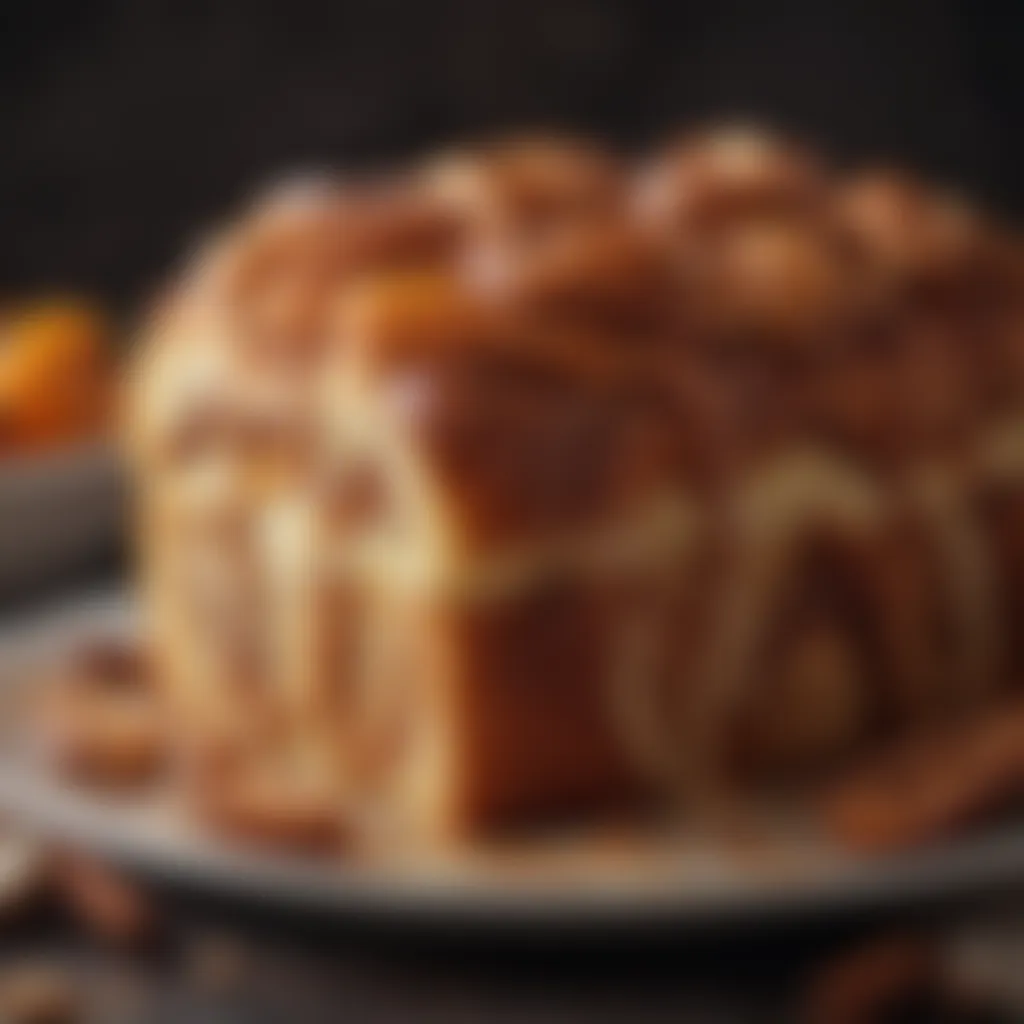
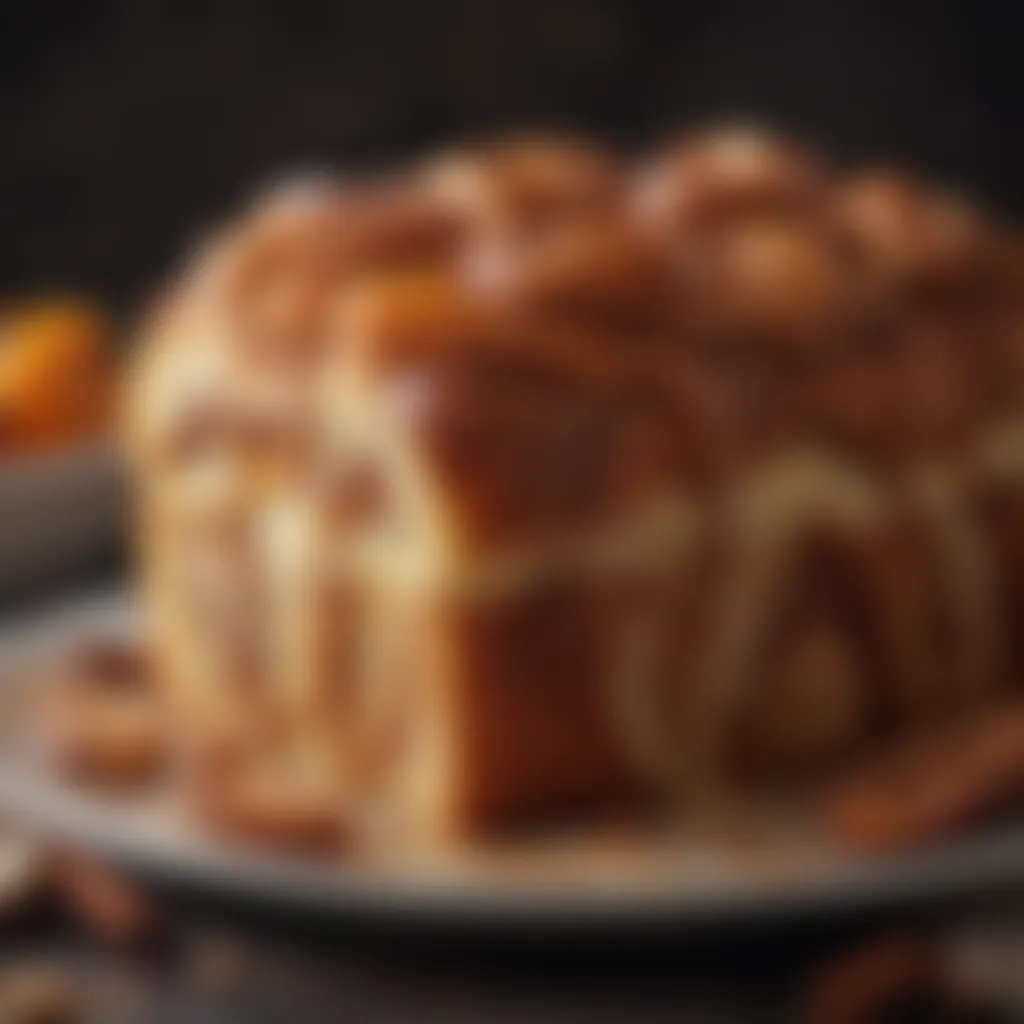
Beyond its delicious flavor, babka carries deep cultural significance. For many Jewish families, preparing babka can be a ritual that fosters connection, conversation, and storytelling. It serves not just as dessert but as a symbol during holidays such as Rosh Hashanah and Passover, where the act of baking often brings families together. Its presence on the table represents not only sustenance but also shared memories and traditions.
In recent years, the trend of "babka art" has surged, encouraging creative takes on this traditional bread, from gourmet cupcakes to frozen desserts. This reinvention caters to contemporary palates while honoring its historic roots. By enjoying babka, we are participating in a communal heritage that spans continents and generations.
Understanding the Ingredients
When it comes to babka, the heart of its flavor and texture lies in the quality and selection of ingredients. This section serves as a stepping stone to understanding how each component plays an integral role in the final product. Choose wisely, and you’ll find that the right ingredients can elevate your babka from ordinary to extraordinary.
Key Components of Dough
The dough is the backbone of any babka. It's not just a base; it creates the structure and allows the delicious fillings to shine. A successful babka dough typically requires high-protein bread flour for strength, sugar for sweetness, non-fat dry milk for richness, eggs for tenderness, butter for flavor and moisture, and salt for balance. All these ingredients combined lead to a dough that's pleasant to handle and bakes into something light and fluffy.
- Bread Flour: Contains more gluten than all-purpose flour, providing that necessary elasticity.
- Sugar: Helps with browning and adds a subtle sweetness to balance out the flavors.
- Butter: Considered the luxury of baking, it enriches the dough and keeps it moist.
Selecting the Right Fillings
Fillings are where the personal touch comes in. They allow a baker to express creativity and accommodate different tastes. Here, you can opt for traditional chocolates, nuts, fruits, or even something unexpected.
Chocolate Varieties
The richness of chocolate varieties can’t be ignored. Dark chocolate chips or finely chopped chocolate lends a deep flavor, while milk chocolate adds creaminess. A significant character of chocolate is its melting quality, which infuses the dough with its flavor.
- Benefit: Complements the sweet bread perfectly, creating a rich treat with every bite.
- Unique Feature: The bittersweet note contrasts well with the soft dough, bringing an indulgent twist.
Nut Mixtures
A nut mixture brings crunch and earthiness to the babka. Walnuts and pecans are popular choices, but almond or hazelnut spreads can be great too. Their key characteristic is providing texture to each slice while contributing to the overall flavor profile.
- Benefit: Adds healthy fats, which help to make the babka more filling.
- Unique Feature: Nuts can also enhance the aroma during baking, tantalizing the senses.
Fruit Options
Fruit fillings are delightful in their own right, offering a freshness that complements the sweet richness of the babka. Options like cinnamon-spiced apples, tart cherries, or even a mixture of berries can create a beautiful burst of flavor.
- Benefit: Provides a refreshing contrast to the sweet, soft dough, amping up the overall taste experience.
- Unique Feature: Can bring moisture when baked, ensuring the babka remains luscious and not overly dry.
The Role of Yeast
Yeast is the magic agent that causes the dough to rise, creating those airy pockets that result in a fluffy texture. By interacting with sugar and moisture, it ferments, producing carbon dioxide that leavens the dough. The choice of where and how you use yeast can make or break the entire baking project.
In essence, understanding the ingredients and what each one contributes is vital for crafting a delectable babka. Whether you prefer classic fillings or are keen to experiment, the joy and satisfaction of baking come from knowledge of these essential components.
Preparation Techniques
Preparation techniques serve as the backbone of crafting a delectable babka. They influence not just the texture and flavor of the final product but also the overall experience of baking. Each phase in this process allows bakers to engage with their ingredients and the dough, leading to an appreciation of the craft involved. This is where patience meets skill, overwhelmingly important given that the nuances here can make or break your babka.
Mixing the Dough
Mixing the dough is the first step where the magic begins. It’s essential to combine the ingredients uniformly so that the yeast, flour, sugar, eggs, and fat meld together into a cohesive mixture. This isn’t just a blend; it’s where the elements come together to create the essence of your babka.
Tips for Mixing:
- Use Room Temperature Ingredients: Room temperature eggs and butter integrate better, creating a smoother dough.
- Combine Wet and Dry Ingredients Separately: Mixing the dry ingredients first before adding the wet ones helps to ensure an even distribution of the yeast and salt.
- Scrape Down the Sides of the Bowl: Don’t forget to incorporate any pockets of flour that may get pushed aside during mixing.
As you mix, the dough will start to come together and might even begin to show signs of elasticity, hinting at the delightful bread that is to come.
Kneading for Optimal Texture
Once the dough is mixed, the next step is kneading, which is crucial for developing gluten. This protein gives the dough its stretch and chewiness, which is characteristic of good babka. Kneading should not be rushed; it requires a firm yet gentle touch to not overwork the dough.
Kneading Techniques:
- Push and Fold: Use the palm of your hand to push down on the dough, then fold it over itself. Turn the dough a quarter turn and repeat.
- Feel the Dough: You should aim for a dough that feels smooth and elastic. If it is too sticky, a little bit of flour can help, but don’t go overboard as this can adversely affect the moisture levels.
- Check for the Window Pane Test: This pivotal test involves stretching a small piece of dough. If it forms a thin membrane without tearing, it’s an indicator that gluten has developed well.
Kneading not only contributes to texture but also helps incorporate air into the dough, which is important for rising.
Proofing: Timing and Temperature
Proofing is where patience plays a crucial role. This process allows the dough to rise and expand through fermentation, thanks to the yeast consuming the sugars in the flour. It’s vital to provide the right conditions during proofing—typically a warm, draft-free environment—to ensure successful fermentation.
Proofing Tips:
- Optimal Temperature is Key: The ideal temperature for proofing is around 75-80°F (24-27°C). If it’s too cold, the fermentation slows down, leading to a dense loaf.
- Timing Can Vary: For the first proof, aim for one to two hours, or until the dough doubles in size. Keep an eye on it; sometimes, it can take longer based on room conditions.
- Second Rise After Shaping: After shaping your babka, a second proof for about 30 minutes will help achieve a lighter texture.
Proofing is not just about waiting; it's about understanding and respecting the dough's needs. Whether you’re rushing through the process or letting it linger a little longer, the outcome is often affected significantly.
Shaping the Babka
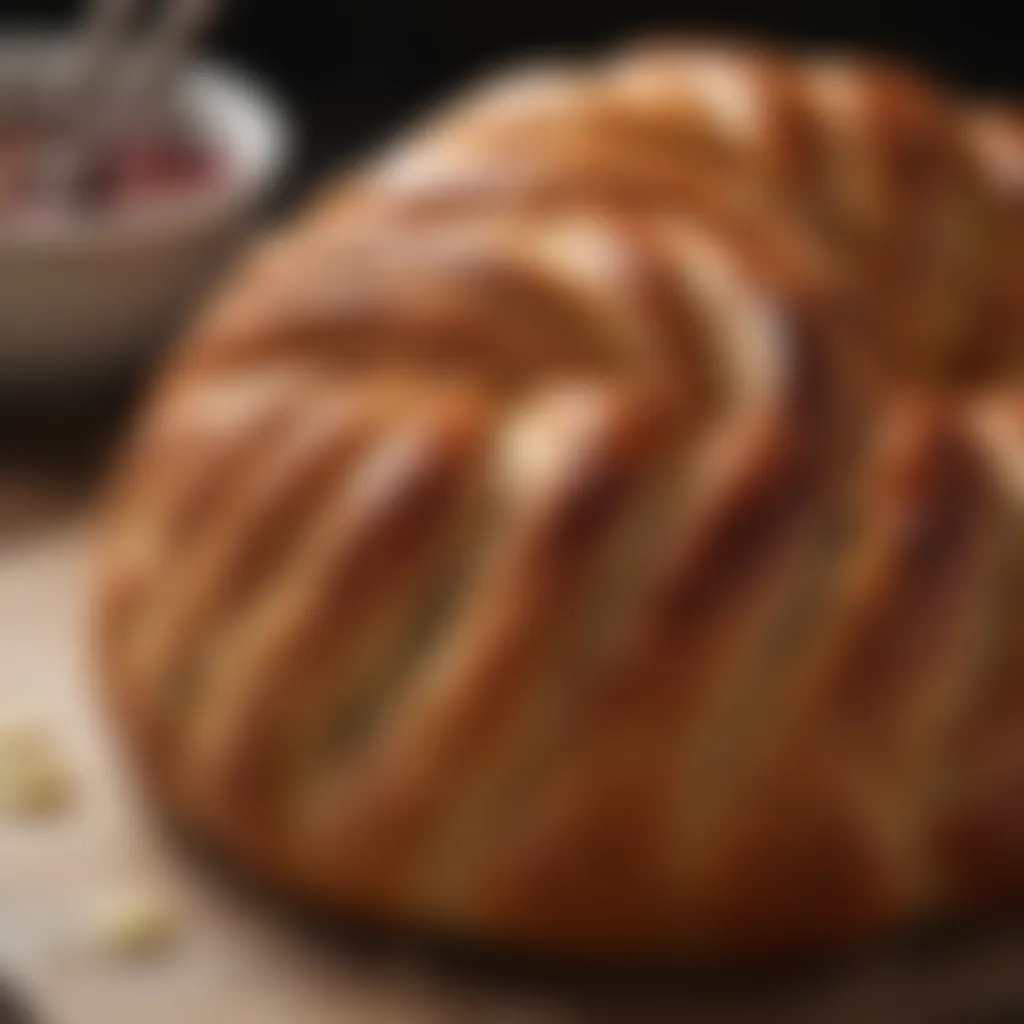
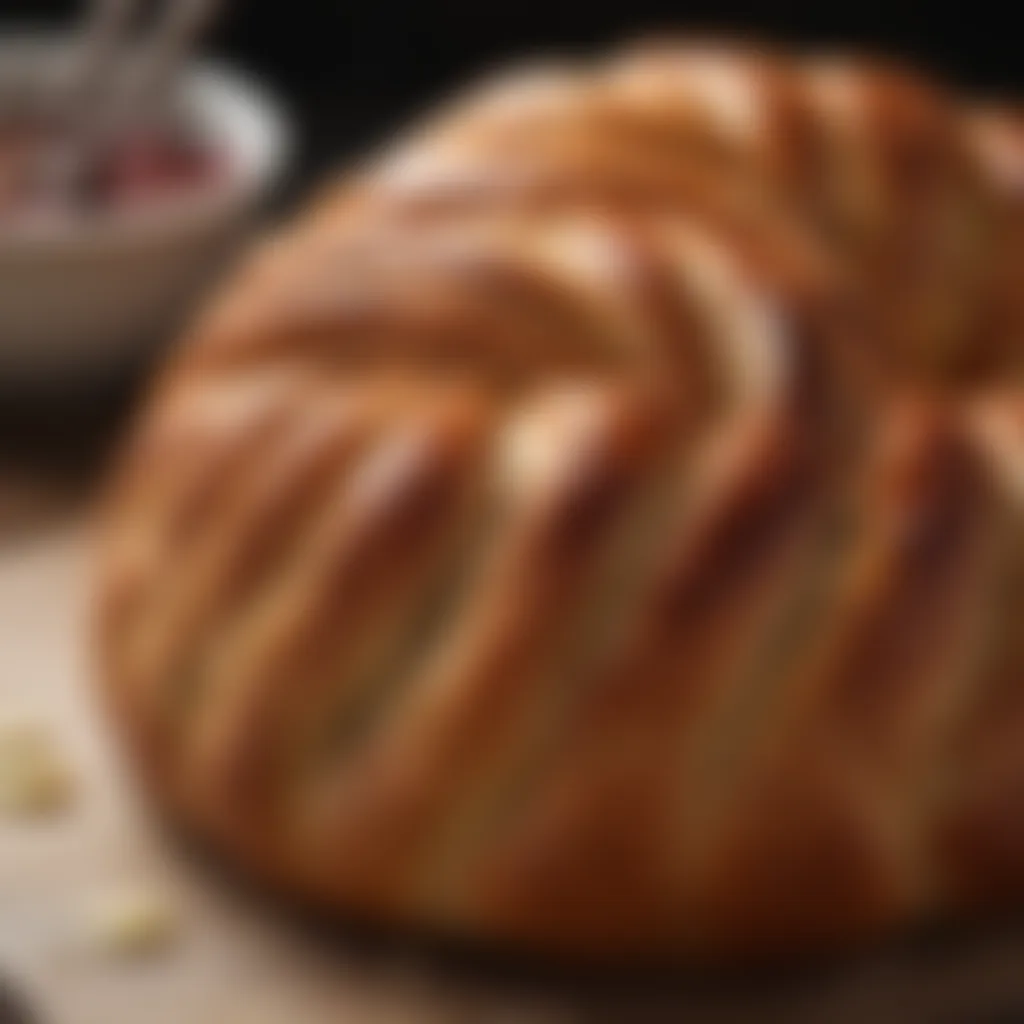
Shaping the babka is more than just a step in the recipe; it is where the artistry of baking truly comes to life. This process not only gives the babka its characteristic appearance but also plays a crucial role in how the flavors intertwine, leading to that delightful burst of filling in every bite. Understanding the nuances of shaping is essential for achieving that perfect combination of aesthetics and taste.
Roll Out for Filling
To start, the dough should be rolled out evenly to about a quarter-inch thickness. This is a critical step, as unevenly rolled dough can make for uneven baking results. Using a floured surface can help prevent stickiness and facilitate smooth rolling. Aim for a rectangular shape, as this will make the filling distribution easier and more uniform.
When it comes to filling, consider that the amount and type can significantly influence the end result. A common mistake is to spread the filling too thickly, which can lead to a dough explosion during baking. Instead, aim for a thin, even layer that complements rather than overwhelms the dough. For instance, if using chocolate, let it melt slightly and spread it so it absorbs into the dough while baking.
The Braiding Technique
Once you have your filled dough ready, the next magic happens in the braiding process. This step is not only functional but also quite visually appealing. After rolling the dough and making your cuts, you can twist and braid the strips together to create the signature babka look. A common method is to make a simple three-strand braid. However, don’t hesitate to experiment with different styles. Each twist in your braid forms a unique pattern, essentially creating fingerprints of your creativity.
This technique ensures that the filling stays nicely enclosed while allowing steam to escape, thus preventing the babka from becoming too dense. Plus, those beautiful swirls are bound to be a conversation starter at the table.
Choosing the Baking Vessel
Finally, selecting the right baking vessel is crucial for your babka's structure and texture. A standard loaf pan is a popular choice, but consider using a decorative pan if you want to impress at gatherings. The material of your pan can impact baking—metal conducts heat better, while glass allows for a slower bake. Be sure to grease the pan beforehand to facilitate a smooth release.
Also, consider the size. A pan that is too large can lead to a flatter babka, losing that sought-after height and fluffiness. Most recipes demand a standard 9x5-inch loaf pan, striking that balance between form and function.
Baking and Finishing Touches
Baking and finishing touches play a pivotal role in elevating the humble babka from mere baked good to an exquisite dessert. This stage is where all previous efforts in mixing, kneading, and shaping come together. It's not just about baking; it's about creating a sensory experience that engages taste, smell, and even eyesight. A well-baked babka should cradle moist, flavorful layers while presenting a golden crust that speaks of careful attention to detail. Achieving this requires understanding the right baking temperature and time, completing the finishing touches with glazing, and knowing how to cool and serve the bakes for the best enjoyment.
Ideal Baking Temperature and Time
The success of any baked item heavily depends on the right oven temperature and baking duration. For babka, an ideal temperature hovers around 350°F (175°C). This temperature allows the dough to rise properly without burning the crust. A common mistake is setting the oven too high, leading to a dark exterior while the inside remains uncooked. Typically, a proper baking time for babka ranges from 30 to 40 minutes. To check if it's ready, one can perform the classic toothpick test—insert a toothpick into the center of the loaf, and if it comes out clean, it’s time to pull it from the oven! Keep in mind that every oven behaves slightly differently, so it's always wise to keep an eye on the babka during the last few minutes of baking.
Glazing for Enhanced Flavor
Glazing is where craftsmanship meets art in babka baking. Applying a glaze not just enhances the flavor but also adds a beautiful sheen that makes the bread visually appetizing. A classic sugar glaze can be crafted by simply mixing powdered sugar with just enough milk or water for a smooth consistency. Brushing the glaze over the hot babka as soon as it comes out of the oven allows it to soak in, enhancing both moisture and sweetness. Additionally, consider experimenting with flavored glazes—perhaps a vanilla-infused glaze or something a bit richer like coffee or chocolate. Go bold here; it’s your chance to elevate the flavors even further.
Cooling and Serving Suggestions
Patience is key when it comes to cooling baked goods. While the sweet aroma might tempt you to slice right away, allowing the babka to cool for at least 15-20 minutes in the pan ensures that it firms up, making it easier to slice without losing its shape. Once cooled, serving can be a delightful affair. Babka pairs wonderfully with various hot beverages like coffee or tea, making it a perfect brunch or afternoon snack. As for presentation, consider slicing the babka and displaying it on a simple wooden board for a rustic charm. When sharing with friends or family, place a selection of spreads, like sweet cream cheese or fruit preserves, on the side to invite mixing and matching flavors.
Remember, the way you finish and serve a dish can be just as important as the flavors within it.
Taking these finishing steps adds an invaluable touch to your babka-making adventure. Your time and love poured into each step will certainly be appreciated when shared with others.
Variations and Innovations
Exploring the variations and innovations in babka crafting opens a realm of creativity within this cherished baked good. The beauty of babka lies not only in its traditional roots but also in its ability to adapt and resonate with the ever-changing palates of modern bakers. These adaptations allow the recipe to flourish in diverse culinary landscapes while maintaining its core identity.
Classic Recipes vs Modern Twists
When one thinks of babka, images of rich chocolate, cinnamon, and nut fillings often come to mind. However, as the culinary world evolves, bakers are pushing the boundaries with innovative spins on the classic recipe. Traditional babka embodies a certain nostalgic charm – its layers of sweet dough and comforting swirls evoke a sense of home.
Modern takes on babka might introduce unexpected elements, such as matcha or salted caramel, reflecting contemporary taste preferences. These twists not only cater to adventurous eaters but also serve to reinvigorate the classic dish, making it relevant in today’s dessert landscape.
By merging the old and the new, bakers can not only honor the heritage of babka but also engage wider audiences. They can explore fusions that might include seasonal flavors, which can turn an age-old recipe into something that feels fresh and innovative.
Dietary Adaptations
The dietary needs of our time lead many bakers to seek alternatives that cater to specific lifestyles without sacrificing flavor or texture. This shift results in tantalizing options that broaden the appeal of babka.
Gluten-Free Alternatives
For those who cannot indulge in traditional wheat flour, gluten-free babka exists as both a challenge and an opportunity. Utilizing flours such as almond, coconut, or a specialized gluten-free blend can yield a delightful texture that rivals its traditional counterpart. What makes gluten-free alternatives a popular choice? They often attract not only those with gluten sensitivities but also health-conscious eaters looking for lighter options.
A major highlight of gluten-free baking is the versatility in flavors. You can create rich chocolate or delightful fruit fillings that shine through even when the dough flour is different. However, it’s important to note that sometimes gluten-free dough can be crumbly and less pliable, requiring meticulous handling and sometimes even extra ingredients to achieve the desired elasticity.
Vegan Options
The rise of veganism has influenced many bakers to rethink traditional recipes. Vegan babka can achieve that same indulgent experience without any animal products. A staple aspect of vegan baking is using plant-based fats instead of butter and substituting eggs with ingredients like flaxseeds or applesauce. This not only opens up the recipe for those following a vegan diet but also appeals to a broader audience looking for dairy-free desserts.
Additionally, the flavor profile can remain robust and delightful. Ingredients like coconut oil lend a richness while allowing the sweet fillings to be the star of the show. However, a consideration in vegan baking is the moisture balance; achieving that tender crumb without the traditional eggs does require careful measuring.
Flavor Experimentations
In the world of babka, the flavors are as limitless as the baker’s imagination. Experimenting with unique fillings can set one’s babka apart from the rest. Why not try out a cherry almond filling or a zesty orange chocolate combo? Each flavor story brings its own personality and may surprise even the most seasoned bakers.
This aspect of innovation not only cultivates creativity but invites a sense of fun in the kitchen. Crafting a flavor experiment could be the perfect weekend project. Plus, you may discover a new family favorite that resonates with your loved ones.
In summary, variations and innovations within babka not only respect its rich heritage but also allow every baker to infuse their personal touch into this beloved sweet bread. Whether it be through reimagined fillings, dietary adaptations, or flavor trials, there are endless paths to explore that make babka baking a worthwhile journey.
Serving Babka: Pairings and Presentation
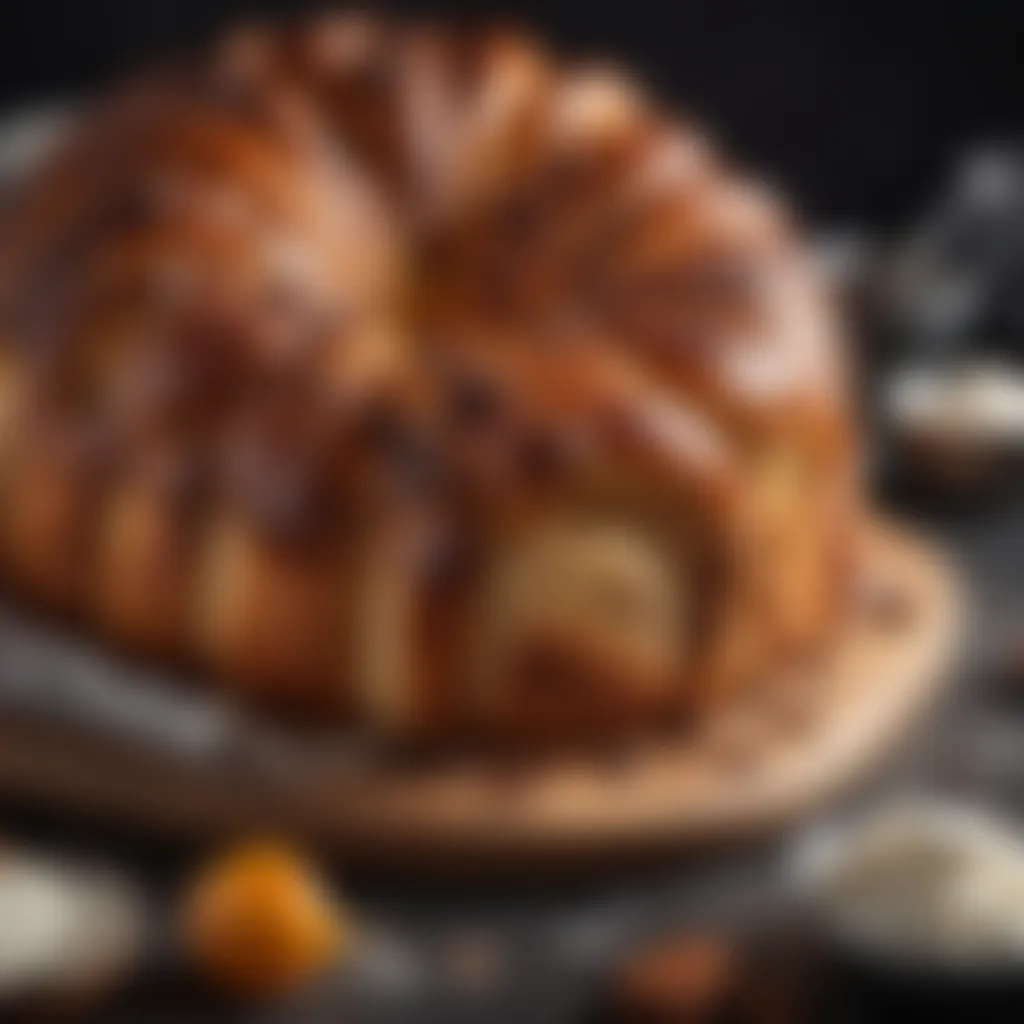
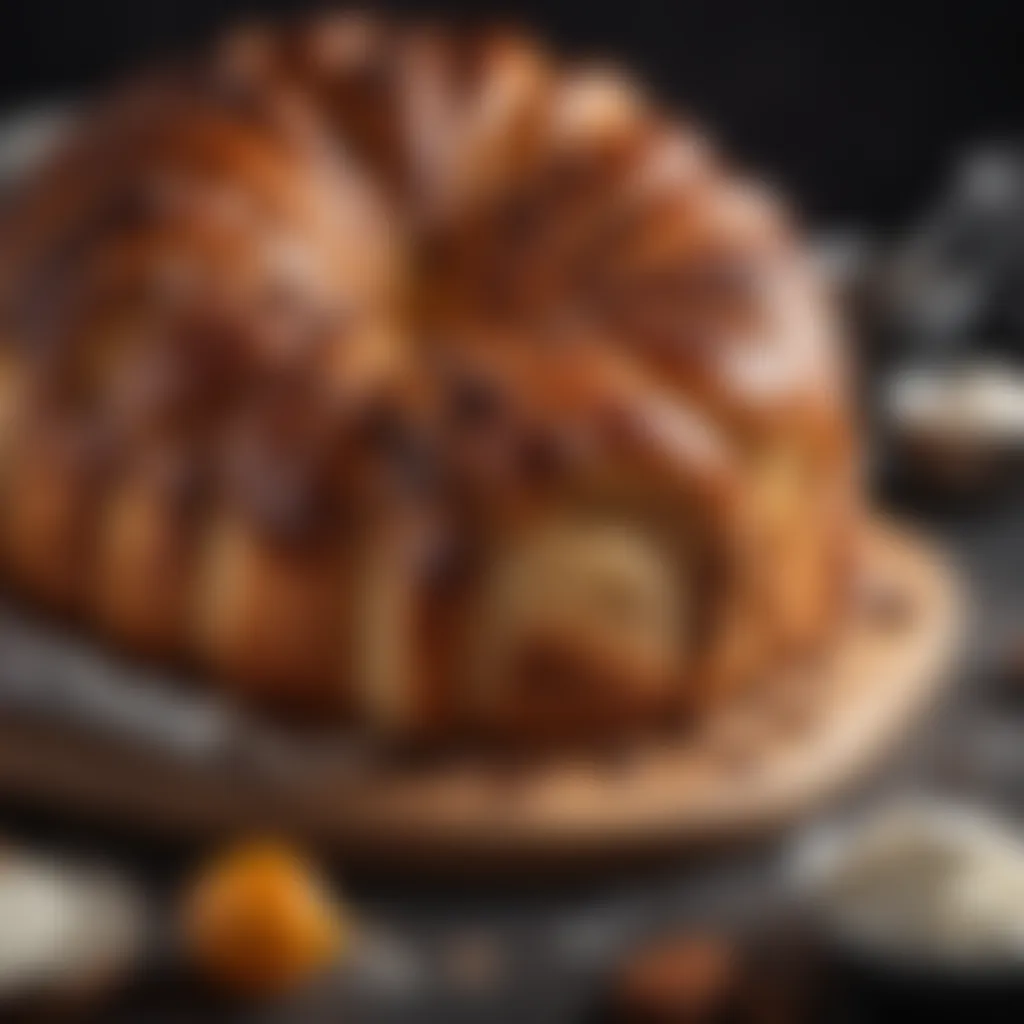
The presentation of babka, alongside suitable pairings, can elevate the experience of enjoying this delightful bread. It’s more than just a treat; it’s a centerpiece. With each slice, when served right, it speaks volumes about the care taken in its crafting. This section dives into the nuances of combining flavors, visual appeal, and the spirit of sharing. Understanding these elements can turn an ordinary babka setting into a gathering that resonates with warmth and hospitality.
Beverage Pairings
Finding the perfect drink to accompany your babka elevates each bite, creating a synergy of flavors. Consider these options:
- Coffee: A rich, dark brew complements the sweetness of babka, especially chocolate filling varieties. The bitterness contrasts beautifully, creating a harmonious experience.
- Tea: A delicate oolong or a spiced chai can enhance the complex flavors within babka. The lightness of tea can balance the richness of the bread, particularly when almond or fruit fillings are used.
- Milk: For classic comfort, a tall glass of cold milk is hard to beat. It’s especially wonderful with sweeter, chocolatey versions.
Choosing the right beverage transforms the babka into a culinary experience that invites conversation and connection.
By being deliberate about drink pairings, you enhance the flavors of the babka while evidently showcasing your thoughtfulness as a host.
Plating Techniques
The way you present babka on the table can draw eyes and create excitement among guests. Here are some plating ideas:
- Simple Slice Arrangement: Place slices neatly on a wooden or slate board. This rustic presentation highlights the textures and colors of the babka, inviting everyone to dig in.
- Tiered Stands: Using tiered cake stands not only showcases different types of babka but also adds a touch of elegance to the table. Mix and match flavors for a visually stunning spread.
- Garnishes: A light dusting of powdered sugar or a drizzle of chocolate glaze can make the babka visually appealing. Consider placing fresh berries or nuts around the base for color and texture contrast.
Utilizing these techniques helps to enhance the overall experience, encouraging appreciation of the craft behind the dish.
Gifting and Sharing
Babka is not just about personal enjoyment; it embodies the spirit of sharing. Gifting babka goes beyond the act of giving; it's about fostering connections. Here’s how to make sharing special:
- Presentation: Wrap the babka in elegant parchment paper with a beautiful twine finish. You can attach a handwritten note to add a personal touch. This elevates the offering to something memorable.
- Occasions: Consider gifting babka on special occasions such as birthdays, holidays, or simply as a surprise for a friend. It’s versatile, catering to various celebrations, whether they’re grand or intimate.
- Pairing with Other Treats: To enhance the gift, add a bottle of homemade jam or a selection of gourmet teas. This creates a thoughtful package that signals care and consideration.
Sharing babka, whether at a gathering or as a special gift, creates moments that everyone can cherish. It's in these small details that the essence of community and friendship shine through.
Troubleshooting Common Issues
Baking is as much about precision as it is about artistry. When making babka, a few hiccups can crop up along the way. Understanding how to troubleshoot common issues is pivotal. Not only does it save time and ingredients, but also enhances the overall baking experience. Addressing these problems means achieving that perfect loaf every time. Here, we'll tackle a few noteworthy challenges that bakers might face and how to overcome them.
Dough Not Rising
One of the most frustrating experiences for any baker is when the dough refuses to rise. There could be several culprits for this unfortunate fate. First off, it’s crucial to check the quality of your yeast. If it’s expired, well, you can toss it right out the window because it's not gonna do its job. Fresh yeast is key here.
Another factor to consider is the water temperature used for activating the yeast. Water that’s too hot can compromise yeast activity; ideally, it should be warm, around 110°F (43°C). When starting the yeast, consider using a little sugar in the water to encourage it to bubble up. Also, don’t forget about the environment. Dough needs warmth to rise, preferably in a draft-free spot.
- Tip: If all else fails, you can create a makeshift proofing box by placing the dough in an oven turned off but slightly warmed from a preheating session. Just keep an eye on it to avoid overheating.
Uneven Baking Outcomes
Baking babka is not just about timing; attention to detail is equally important. If you find that the top of your babka is getting too dark while the inside remains undercooked, consider your oven's hot spots. Every oven has its quirks, and some areas can cook faster than others. Understanding your oven well makes a world of difference.
Another thing to think about is your baking vessel. If you’re using a dark pan, it may conduct heat differently than a light-colored one. Adjusting your baking time and temperature can help, but also keep an eye on the internal temperature of the babka. It should reach around 190°F (88°C) for doneness.
- Essential Tools: A simple thermometer can become your best friend in ensuring even baking, especially for larger loaves.
Flavor Imbalance
A babka should sing in your mouth, with each layer bringing forth a rich harmony of flavors. However, if you find it lacks depth or tastes off, it could be a matter of ingredient quality or proportion. For starters, ensure that you’re using fresh, high-quality cocoa powder if chocolate is your filling. Also, be cautious with salt. Too little, and flavors will be dull; too much, and it can overpower the sweetness.
When experimenting with different fillings, like fruits or nuts, think about balancing sweetness and acidity. A little sprinkle of citrus zest can elevate flavors dramatically. It can provide that much-needed lift and help tie everything together.
Remember: Baking is often about adjustments. Don’t hesitate to take notes while experimenting. This way, you can replicate your culinary triumphs and avoid past failures.
In summary, whether it’s the dough’s stubbornness, uneven bakes, or flavor miscalculations, these issues can be rectified with a little knowledge and practice. Every loaf tells a story, and when you learn how to troubleshoot, your babka will turn out just right, every time.
Culmination of the Culinary Journey
The final part of the babka-making process is more than just a last step; it is where all the labor and attention to detail culminate into a gratifying experience. Here, the dough rises and transforms into a luscious bread, rich in flavor and aroma. This journey involves not merely following instructions but understanding the various elements involved—from the delicate interactions of yeast to the sweetness of the filling. Each bite should reflect a combination of flavors and textures, showcasing the craft inherent in babka baking. When you take the first bite, that’s the moment you realize this is not just about food; it’s about the cultivation of patience and passion.
Understanding the Craft Inherent in Babka
Creating a successful babka is not something that can be achieved by simply following a recipe. It is a craft that involves precision and intuition.
- Ingredient Interplay: The dance between sugar, butter, and flour shapes the dough. Each ingredient impacts the texture and flavor significantly. Too much butter might leave it greasy; too little might dry it out.
- Kneading Technique: When kneading, it’s essential to find the right rhythm. Too much force can break the gluten structure, while too little can lead to a dense loaf.
- Proofing Timing: This phase can be tricky. A warm kitchen promotes quicker rises, while a cooler environment demands more patience. Knowing when the dough is ready can take time to master.
By honing these techniques and understanding the craft, bakers can elevate their babka to an art form.
Appreciation of Tradition and Innovation
Babka is steeped in tradition, often evoking memories of family gatherings and shared moments. While maintaining these traditions, there is also room for freshness and creativity. The beauty of babka lies in its ability to adapt and evolve. As a home baker, consider exploring:
- Traditional Flavors: Stick to classics like chocolate or cinnamon if you’re just starting out.
- Modern Twists: Introduce unexpected fillings, such as matcha or salted caramel, to make it your own.
- Presentation Styles: The way you plate and serve babka can be as innovative as its flavors. Serve it in stylish platters or even individual-sized portions.
This balance of respect for heritage and encouragement of creativity is pivotal in crafting that delicious loaf while ensuring each bite tells the story of both past and present.
Personal Reflection Through Baking
Baking babka is not a mere task but a journey that invites reflection. As you knead the dough or watch it rise, you might find moments for contemplation.
- Culinary Mediation: Focusing on the baking process can be therapeutic. It becomes a blend of mindfulness and creativity.
- Creating Memories: Each babka baked can hold a personal story. Did you bake it for a family gathering? Was it a challenge you undertook during a quiet afternoon?
- Sharing with Loved Ones: The finished product can bring people together. Sharing that warm loaf can create a connection, fostering conversations that linger long after the last crumb is gone.
Baking babka is, at its essence, more about the experiences created and lessons learned throughout. It is the culmination of both culinary skills and emotional ties that makes this journey worthwhile.







